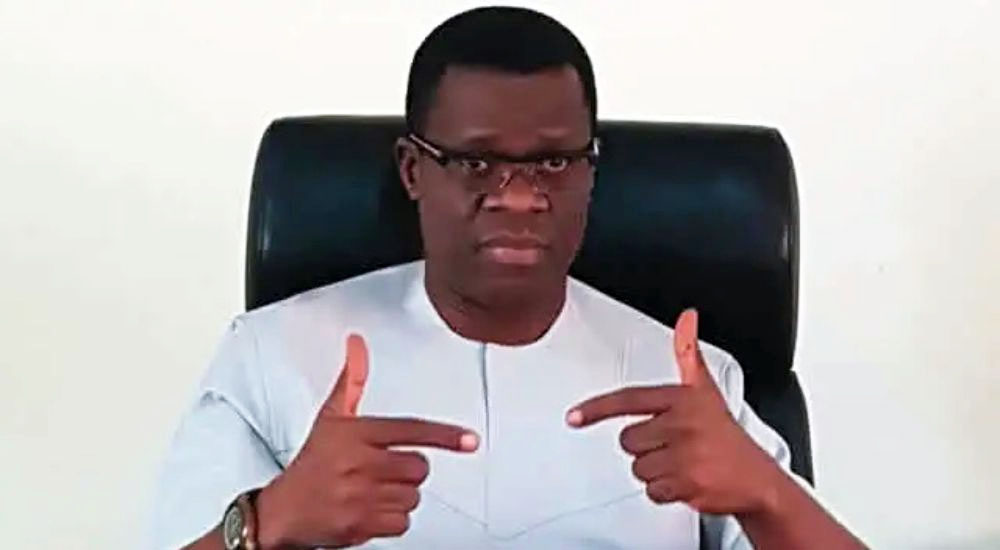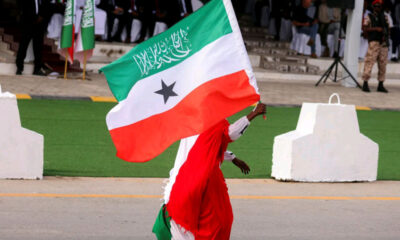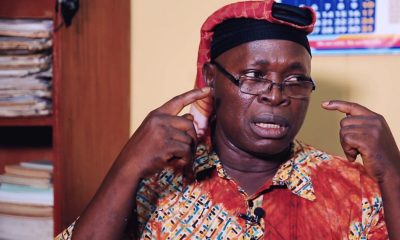News
Why Islamic organisations were formed – Oloyede

Why Islamic organisations were formed – Oloyede
Registrar of the Joint Admissions Matriculation Board (JAMB) Prof Ishaq Oloyede, has said that formation of Islamic organisations was to check the influence of Western civilization brought by the missionaries.
Oloyede, who is also the Secretary General of the Nigerian Supreme Council for Islamic Affairs (NSCIA), said forming Islamic organisations became a necessity to preserve the Islamic cultures from eroding
According to him, the practice of setting up Islamic organisations is not only in Nigeria but in other countries like Egypt, Tunisia, and Mali, among others.
He said as far back as 1914, several Islamic organizations were formed to check what he called imperialism by the colonialists.
“Muslims worldwide saw that the imperial government would wipe them off and they came up with the idea of setting up one group or the other to promote the beauty of Islam and be part of the global movement,” he said.
Oloyede recalled that the founding fathers of Jama-at-ul Islamiyyah were conversant with contemporary global issues despite their level of education.
According to him, their concern was to safeguard the future of Islam and the Muslims, especially the younger ones.
Oloyede, however, urged leaders of Islamic organisations to go back to the drawing board and learn from the founding fathers the ideal and pristine Islamic principles which they propagated.
He said they should learn to understand the language of the present generation of Muslim children which he referred to as ‘Gen Z’ to eradicate the moral decadence in the society.
Deputy Governor of Ogun State, Mrs Noimot Salako, said the story of Jama-at-ul Islamiyyah reflects resilience, growth and unwavering dedication to principles.
READ ALSO:
- U.S dollar set for first weekly fall in 2024 while naira shows momentum
- UK Home Office to extend work visa sponsor licenses renewal from 4 to 10 years
- Osimhen’s post AFCON scoring form excites new Napoli boss
“We are not merely acknowledging a century of existence; we are celebrating a legacy, a testament to the enduring spirit and commitment of the founders and members of Jama-at-ul Islamiyyah… Through trials and triumphs, our predecessors laid the foundation upon which we stand today. They sowed the seeds of a movement, fostering a sense of brotherhood and sisterhood that has become the hallmark of Jama-at-ul Islamiyyah.”
Mrs Salako, an engineer, tasked the organisation with youth engagement and funding, noting they are a major groundwork for the future.
“We should engage directly with the youths where they are likely to be; on TikTok, IG, Reddit etc. If we check this audience, the number of under 40s will be quite low. How will the youth get these messages? Similarly, without funding, all the noble plans of the association will be pipe dreams,” she said.
The Deputy Governor also urged members of Jama-at-ul Islamiyyah to take the centenary celebration as a moment of reflection, gratitude and renewed commitment.
Former National Commissioner of the Independent National Electoral Commission (INEC) Prof. Lai Olurode charged Jama-at-ul Islamiyyah to embrace a cosmopolitan orientation in its operations and promote its membership drive.
The retired Professor of Sociology at the University of Lagos noted that Jama-at-ul Islamiyyah is not visible enough in the establishment of Islamic and Western school systems, which he called a major tool of propagation and ideology.
“On key variables and in comparison to the other sister organizations established around the second decade of the twentieth century, the Jama’at is just above average, majorly present in Lagos and its suburbs. The Jama’at is not visible enough in the establishment of madrassah (a major tool of propaganda and ideology) and even the modern school system. The Jama’at lost an opportunity to be the sole proprietor of the Muslim International School, Moleefon, Iwo.
“It is also imperative for the Jama’at to open up to tolerate competitiveness and a cosmopolitan orientation in place of a provincial outlook – promote common/universal instead of fractured/limited membership (no to Lagosians versus others),” he said.
Olurode meanwhile commended the organisation for rising to challenge the hostility of the colonial authorities towards the local population, especially Muslims.
“The colonial state was exploitative and ruthless and was generally hostile toward the local population and Muslims particularly. It displayed ambivalence towards the education of Muslims. There was a blossoming of Islamic organizations in response to marginalization and discriminatory treatment. The coming of government Muslims schools did not assuage the feelings of exclusion felt by the Muslims.”
President of Jama-at-ul Islamiyyah, Hashim Oyekan, an engineer, lauded the dedication of the founding fathers of the organisation, noting that the contributions of the organisation cannot be overlooked in the development of Islam and Muslims in Nigeria.
He said: “This historical milestone connects the past to the future, as we acknowledge the dedication of those who planted the seeds of this great movement a century ago. We serve as the bridge between the past and the future.
“In reflecting on the development of Islam and Muslims in Lagos and Nigeria, one cannot overlook the significant contributions of Jama-at-ul Islamiyyah of Nigeria, its founder, companions, doctrines, and impact. Today, we honour the memory of the founder, late Alhaji B.L. Agusto, and all dedicated Muslims who served Islam through this Jama’at.”
He enjoined members to intensify their commitment to the growth of Islam as they mark a new phase for the organisation.
“As we enter a new phase in the life of our beloved Jama’at, I urge everyone to intensify their commitment to its growth and the advancement of Islam. Let’s elevate our services to the next level, building on the gains made and projecting a sustainable future for the Jama’at. Our values and virtues, inspired by our founding fathers, continue to guide us. Let’s celebrate our 100th anniversary by transmitting these virtues and the Jamaat’s doctrines,” he said.
Why Islamic organisations were formed – Oloyede
News
Former INEC REC Warns of “Chaos” in 2027 Over E-Transmission of Election Results

Former INEC REC Warns of “Chaos” in 2027 Over E-Transmission of Election Results
A former Resident Electoral Commissioner (REC) of the Independent National Electoral Commission (INEC), Mike Igini, has raised concerns that Nigeria’s ongoing debate over electronic transmission of election results exposes unresolved legal, institutional, and technological challenges, despite years of electoral reforms. Speaking on Channels Television’s Politics Today on Monday, Igini warned that recent Senate amendments to the Electoral Act could create confusion and vulnerabilities in future elections, particularly the 2027 general polls. He stressed that failing to clarify rules on electronic results transmission risks undermining democracy, transparency, and public confidence.
The controversy stems from the Senate’s recent amendment to the Electoral Act, which now allows electronic transmission of results but removed the “real-time” requirement that had previously been proposed to enable direct uploading from polling units to the INEC Result Viewing Portal (IREV). Under the amendment, Form EC8A, the physical result sheet, remains the primary document in cases of internet outages or connectivity failure. Igini cautioned that this creates a grey area that could trigger disputes in 2027 if presiding officers are allowed discretion over network availability, highlighting that legal and technological clarity is essential to avoid chaos.
READ ALSO:
- DHQ Confirms 100 US Military Personnel Arrive in Bauchi for Counter-Terrorism Training
- Dokpesi Jr, Ex-GMD Akiotu Clash Over DAAR Communications Mgt Restructuring
- EFCC Holds El-Rufai Overnight Over ₦423bn Kaduna Corruption Allegations
Referencing a 2021 technical report by INEC and the Nigerian Communications Commission (NCC), Igini said Nigeria possesses adequate telecommunications coverage, with 2G and 3G networks covering about 93% of the country, making electronic transmission feasible nationwide. INEC had also mapped polling units to mobile network operators and prepared SIM cards and data arrangements to ensure smooth uploads to IREV. He explained that Nigeria had previously relied on interim innovations, including biometric voter registers, card readers, and digital result-viewing platforms, to enhance transparency where legal provisions prohibited full electronic transmission.
Igini further warned that introducing discretionary fallbacks for “network issues” could reintroduce vulnerabilities, as presiding officers might abuse their authority to manipulate results. He emphasised that modern election devices, such as BIVAS machines, can operate both online and offline, uploading results at the nearest connectivity point to ensure integrity in IREV. “The whole purpose of IREV is to make results verifiable and immutable once entered. Allowing manual override defeats the reforms we have painstakingly implemented over the years,” he said.
He also noted that judicial interpretations and evolving legislative amendments have contributed to uncertainty over the legality of technological innovations in elections. Igini urged lawmakers to consider the long-term implications of changes to the Electoral Act, stressing that Nigeria’s democratic stability relies on cooperation between INEC, the judiciary, and key stakeholders. “Our democracy’s future depends on the rule of law. Without it, society risks being dominated by those who act for personal interest rather than public good,” he added.
With the 2027 elections approaching, Igini’s warnings underscore the need for clear legal frameworks, technological preparedness, and robust institutional coordination. He urged all stakeholders to work collaboratively to ensure that electronic transmission of results enhances transparency, accountability, and credibility in Nigeria’s electoral process.
Former INEC REC Warns of “Chaos” in 2027 Over E-Transmission of Election Results
News
Teargas, Chaos at EFCC as El-Rufai’s Supporters Clash with Security Operatives

Teargas, Chaos at EFCC as El-Rufai’s Supporters Clash with Security Operatives
Tension gripped Abuja on Monday as security operatives fired teargas to disperse protesters and supporters of former Kaduna State Governor, Nasir El-Rufai, during a confrontation at the headquarters of the Economic and Financial Crimes Commission (EFCC).
The standoff reportedly occurred when hundreds of El-Rufai’s supporters accompanied him to the anti-graft agency’s headquarters, escalating an already charged political atmosphere in the Federal Capital Territory.
Eyewitness accounts and video footage circulating online showed security personnel deploying teargas canisters as crowds surged toward the EFCC complex.
In one of the videos, agitated voices were heard declaring, “We will come back; when it clears, we will come back,” suggesting the group’s resolve to sustain their protest despite the crackdown.
READ ALSO:
- NSCIA Secretary-General Clarifies Council Receives No Government Funding
- Saudi Supreme Court Calls on Muslims to Sight Ramadan Crescent Moon on Tuesday Evening
- Nigeria Tax Act 2025: FG Clarifies No New Construction or Bank Taxes
The development follows reports last Thursday that El-Rufai was allegedly stopped by security operatives at the Nnamdi Azikiwe International Airport, Abuja, in what his supporters described as an attempted arrest.
While official details surrounding the airport incident remain unclear, the situation appeared to have heightened tensions among his loyalists.
El-Rufai, who served as governor of Kaduna State from 2015 to 2023, remains a prominent political figure and a key voice within Nigeria’s political landscape.
His tenure was marked by sweeping reforms as well as controversy over security challenges and policy decisions in the state.
As of press time, the EFCC had yet to issue an official statement clarifying the circumstances surrounding Monday’s confrontation or addressing reports of any investigation involving the former governor.
Security presence around the commission’s headquarters was significantly reinforced following the clash, with access to parts of the area temporarily restricted.
The incident adds to growing political tensions in the country, particularly as anti-corruption investigations continue to intersect with high-profile political actors.
Teargas, Chaos at EFCC as El-Rufai’s Supporters Clash with Security Operatives
News
NSCIA Secretary-General Clarifies Council Receives No Government Funding

NSCIA Secretary-General Clarifies Council Receives No Government Funding
The Secretary-General of the Nigerian Supreme Council for Islamic Affairs (NSCIA), Prof. Is-haq Oloyede, has clarified that the council has never received financial support from any government, either within or outside Nigeria. Speaking in Lagos at the 31st Annual Pre-Ramadan Lecture of the University of Lagos Muslim Alumni (UMA), Oloyede stressed that the NSCIA operates independently and relies largely on modest private donations to sustain its activities.
Oloyede, who also serves as Registrar of the Joint Admissions and Matriculation Board (JAMB), explained that in his 15-year tenure as NSCIA Secretary-General, the council had not received “a kobo” from any government. He added that fewer than 20 individuals have donated amounts up to ₦500,000 since 2013, highlighting that the council functions without significant external funding. He decried misinformation and divisive narratives suggesting government involvement under the leadership of the Sultan of Sokoto, Muhammad Saad Abubakar, noting that such speculation undermines unity within Nigeria’s Muslim community.
READ ALSO:
- Saudi Supreme Court Calls on Muslims to Sight Ramadan Crescent Moon on Tuesday Evening
- Nigeria Tax Act 2025: FG Clarifies No New Construction or Bank Taxes
- Israeli Airstrikes Kill 12 in Gaza as Violence Persists Despite Ceasefire
Speaking on the theme “Muslims: The Challenge of National Security,” Oloyede warned against viewing insecurity, terrorism, and banditry through a religious lens. He said extremists often cloak their violent acts in religious language, but such actions do not reflect Islam. “Islam cannot be determined by what extremists say or do. We have a duty to correct that narrative,” he said, urging Muslims to reject all forms of extremism while understanding that insurgency thrives on enabling political, social, and economic conditions.
Oloyede stressed that security is central to Sharia, emphasizing that a true Muslim is someone “from whose actions neighbours — regardless of their faith — are safe and secure.” He cautioned against reducing insecurity to regional or religious differences, noting that all parts of Nigeria face security challenges. He called on Muslims to embrace moral responsibility, civic accountability, and practical partnerships to improve national security.
Other speakers at the lecture also highlighted the societal dimensions of insecurity. Dr. Ridwan Jamiu, Chief Imam of Lekki Central Mosque, described insurgents as agents of evil and stressed the need for religious leaders to promote peace and guide followers toward positive community engagement. Lagos State Assembly Speaker Mudashiru Obasa identified poverty and economic inequality as key drivers of insecurity and urged the government and policymakers to focus on job creation, education, and inclusive development as long-term solutions.
The lecture, part of the annual pre-Ramadan engagements, comes at a time when Nigeria continues to grapple with complex security challenges, including insurgency in the Northeast, banditry in the Northwest and North-Central, and rising violent crime in the South. Experts emphasize that national cohesion, interfaith cooperation, and community-led security initiatives are vital to tackling these threats effectively.
NSCIA Secretary-General Clarifies Council Receives No Government Funding
-

 Education2 days ago
Education2 days agoCheck Your Name: UNILORIN Releases Updated NELFUND Refund List for 2024/2025 Students
-

 News2 days ago
News2 days agoOsogbo Sons and Daughters Mark 5th Anniversary with Awards, Political Undertones
-

 metro1 day ago
metro1 day agoUS Freezes Assets of Eight Nigerians Over Boko Haram, ISIL, Cybercrime Links
-

 metro3 days ago
metro3 days agoWoman Arrested Over Murder of Nigerian E-Hailing Driver in South Africa
-

 metro3 days ago
metro3 days agoBoko Haram Terrorists Release Video of 176 Abducted Kwara Residents
-

 News2 days ago
News2 days agoAfenifere Calls for Immediate Take-Off of State Police as Terror Threats Rise in Yorubaland
-

 metro1 day ago
metro1 day agoTerror in Lagos Traffic: Cutlass Gang Unleashes Mayhem on Mile 12–Ketu Road
-

 Entertainment1 day ago
Entertainment1 day agoMystery in Lekki: Police Probe Death of Two Nollywood Crew Found Lifeless in Parked Car















